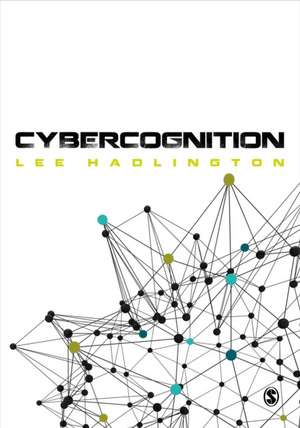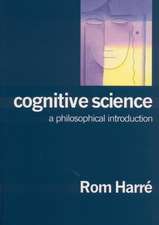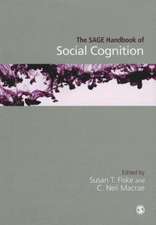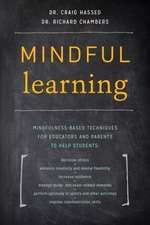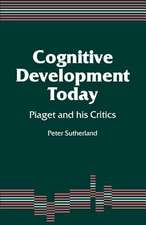Cybercognition: Brain, behaviour and the digital world
Autor Lee Hadlingtonen Limba Engleză Paperback – 3 mai 2017
Cybercognition explores the ideas of technology addiction, brain training and much more, and will provide students with a guide to understanding concepts related to the online world.
It answers important questions:
- What is the impact of digital technology on our learning, memory, attention, problem-solving and decision making?
- If we continue to use digital technology on a large scale, can it change the way we think?
- Can human cognition keep up with technology?
| Toate formatele și edițiile | Preț | Express |
|---|---|---|
| Paperback (1) | 303.75 lei 3-5 săpt. | +22.16 lei 7-13 zile |
| SAGE Publications – 3 mai 2017 | 303.75 lei 3-5 săpt. | +22.16 lei 7-13 zile |
| Hardback (1) | 831.09 lei 6-8 săpt. | |
| SAGE Publications – 3 mai 2017 | 831.09 lei 6-8 săpt. |
Preț: 303.75 lei
Nou
58.12€ • 63.33$ • 48.98£
Carte disponibilă
Livrare economică 02-16 aprilie
Livrare express 19-25 martie pentru 32.15 lei
Specificații
ISBN-10: 1473957192
Pagini: 248
Dimensiuni: 170 x 242 x 19 mm
Greutate: 0.44 kg
Ediția:First Edition
Editura: SAGE Publications
Colecția Sage Publications Ltd
Locul publicării:London, United Kingdom
Recenzii
Written in a clear, concise and accessible style, this book will keep readers engaged and reading on.
The language of the book is lucid and impressive, and the sections follow a natural flow. Some of most influential aspects of the book include learning aims at the start of each chapter, Information snippets and questions to consider, detailed tables and figures, and a chapter summary that is informative and elegantly written.
The book covers the effects of being online on such cognitive processes as memory, perception, and attention. and is written for undergraduate and graduate students of cyberpsychology and cognitive psychology.
In Cybercognition, Hadlington explores two questions; in accessing the virtual world of the Internet, are we different cognitively than when we operate in the physical world, and do our interactions with this virtual world change us cognitively.
Hadlington reflects on a broad sampling of cognitive research to explore questions such as; does experience with video games and computer-based exercises improve our cognitive functions, what is multitasking and do we get better at it, how are the frequent interruptions we get from our digital devices affecting the way we do other things, how are digital technologies affecting education, and how might we assess the credibility of information we find on the Internet.
Rather than selecting research to support a good story, Hadlington offers a balanced sampling, one that more truthfully represents what is known in this area. If you are looking for information and credibility rather than entertainment, this is a good place to start.
Cuprins
2. The Human Information Processor
3. The Population(s) of Cyberspace
4. Attracting Attention in the Digital Environment
5. Digital Gaming, Brain Training and Cognition
6. Multitasking
7. Task Switching and Digital Technology; The Impact of Interruptions
8. Technology and Education
9. Decision Making in the Online Environment; Credibility
10. Search Strategies and Heuristics
11. Technology Addictions and Cognition
12. The End - Where do we go from here?
Notă biografică
Dr Lee Hadlington has been a Senior Lecturer at De Montfort University since 2006 after completing his PhD at Wolverhampton University. Originally coming from a background in applied cognitive psychology, he has developed a research profile in the area of Cyberpsychology. His main focus of interest is exploring the way in which humans use cognition in the online environment as well as the potential for digital technology to change the underlying processes that we use in daily life. Associated with his work in the area of Cyberpsychology is a keen interest in exploring key aspects of technology-enabled crime. He has also worked extensively with a variety of external organisations in exploring aspects of insider threat, susceptibility to cybercrime and attitudes towards cybersecurity. The aim of this research is to help identify potential indicators that could highlight a susceptibility to cybercrime alongside an examination of how individual differences play a role in risky online behaviours.
He also attempts to hide his mild Haribo ¿ addiction from his co-workers on a daily basis and also has a 14 year old cat that still believes she is a kitten. When not trapped behind a desk or teaching his lovely students he likes nothing better than to throw himself around various forest trails on his trusty mountain bike, much to the annoyance of dog walkers, ramblers and his army of minions that have to wash his bike/clothes.
